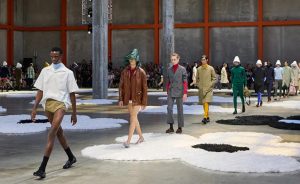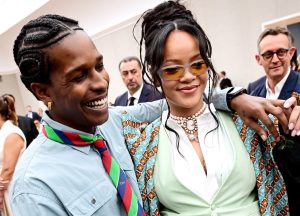From robots that sew and cut fabric to AI algorithms that predict style trends, VR mirrors in dressing rooms, shopping off the runway and a number of other innovations show how technology is shaping fashion. The UK has always pushed the boundaries of fashion, and made headlines for the powerhouse creativity of Alexander McQueen, Paul Smith, Vivienne Westwood and Stella McCartney. So it doesn’t come as a surprise to perceive how fashion talent in the UK is at the cutting edge of fashion technology and experimenting with emerging technologies to disrupt traditional fashion.

The UK is rapidly establishing itself as a global hub for fashion tech innovation, combining cutting-edge technology with creative design to revolutionize the fashion industry. Cities like London are at the forefront, fostering a vibrant ecosystem of startups, universities, and established brands that are pioneering advancements in sustainable materials, virtual try-ons, augmented reality shopping experiences, and AI-driven fashion design. This convergence of technology and fashion enhances consumer engagement and personalisation and promotes sustainability and efficiency within the supply chain.
London Fashion Week serves as a platform for showcasing some of these immersive ventures. For instance, in 2023, the Moncler Genius showcase during London Fashion Week attracted more than 10,000 people to its immersive presentation combining the world of fashion, sport, art and culture. The Italian luxury brand created mini worlds to highlight each co-creators’ collection under one roof and Olympia allowed the brand to invite the public into its universe with an immersive exhibition with fashion, live performances and a foam party!
The immersive live event also witnessed a live performance by Alicia Keys, who was joined by Little Simz and Cleo Sol. Moncler CEO Remo Ruffini told British Vogue. “I felt the energy of more than 10,000 people, of different creative energies, of fashion, music, art, design, sport inspiring each other and mixing together. That’s a new chapter for genius… Today, creativity is fluid, different worlds interact and they inspire each other. And that is where you find Genius.”

Image Source: Burberry
British luxury fashion brand Burberry retains its reputation as an innovator and experimenter around fashion technology. Burberry entered the crypto space with NFTs, launching a digital clothing line on a blockchain platform. The brand has been a leader in metaverse experiences, partnering with platforms like Roblox, Minecraft and Mythical Games to create virtual experiences and NFTs for its existing and new customers and markets. For instance, the brand partnered with Mythical Games to release a game titled ‘Blankos Block Party’ which also houses limited edition NFTs. Burberry is also one of the machine learning pioneers in the industry.
Per AIDaily, “To tackle the problem of counterfeit goods, Burberry uses image recognition technology which can determine, from a photograph, whether or not a product is genuine by analysing minute details in weaving and texture… with a reported 98 per cent accuracy, thereby halting the circulation of counterfeit goods which could compromise Burberry’s reputation for quality.” Burberry was also among the first in the industry to leverage Facebook chatbots into providing potential customers with information about their new products and personalise an individual’s retail experience by encouraging people to voluntarily sign up for customer loyalty programmes with this information being used to provide personal recommendations both in brick- and- mortar and digital commerce.
Fashion designer Craig Green – whose accolades include British Menswear Designer at the Fashion Awards 2016, 2017 and 2018, Menswear Guest Designer at Pitti Uomo 94 in 2018, the BFC/GQ Designer Menswear Fund prize 2016 and Emerging Menswear Designer at the British Fashion Awards 2014 – has recently gained recognition for pioneering new production processes that has gained him critical acclaim and subsequently he was appointed Member of the Order of the British Empire in the 2022 Birthday Honours for services to fashion. Newer fashion brands like Pangaia– a materials- science-led label – have become a flag-bearer for sustainable fashion through smart technology. The fashion brand is rooted in tech, natural sustainable resources and bio-engineered materials.

The exciting intersection of fashion and technology
In the dynamic landscape of the UK, digital experiences are undergoing a transformative evolution, propelling fashion into an era defined by technology. As innovations continue to shape every facet of fashion, from design to production and communication, the anticipation of a thrilling future is palpable. However, amidst this digital renaissance, the enduring relevance of omnichannel strategies and tangible, physical interactions cannot be overstated.
While digital platforms offer unprecedented reach and immersive experiences, they complement rather than supplant traditional channels. Omnichannel strategies, seamlessly integrating online and offline touchpoints, remain paramount in ensuring a cohesive brand experience and engaging diverse consumer segments. Moreover, embracing a philosophy of enhancement rather than replacement, industry leaders can recognize the synergistic potential of merging digital innovations with established practices.
The UK’s distinctive position at the nexus of technological advancement and luxury fashion heritage amplifies its allure as a breeding ground for fashion innovators. Here, the convergence of cutting-edge tech infrastructure and a storied legacy of craftsmanship fuels a culture of experimentation and ingenuity. This fertile ecosystem encourages collaboration, fosters creativity, and propels the industry towards new frontiers of innovation. In essence, as the UK harnesses technology to redefine the future of fashion, it does so with a deep appreciation for omnichannel strategies, physical engagements, and the symbiotic relationship between tradition and innovation. It is within this dynamic crucible that fashion’s next chapter is being written.
Jasmeen Dugal is Associate Editor at FashionABC, contributing her insights on fashion, technology, and sustainability. She brings with herself more than two decades of editorial experience, working for national newspapers and luxury magazines in India.
Jasmeen Dugal has worked with exchange4media as a senior writer contributing articles on the country’s advertising and marketing movements, and then with Condenast India as Net Editor where she helmed Vogue India’s official website in terms of design, layout and daily content. Besides this, she is also an entrepreneur running her own luxury portal, Explosivefashion, which highlights the latest in luxury fashion and hospitality.










